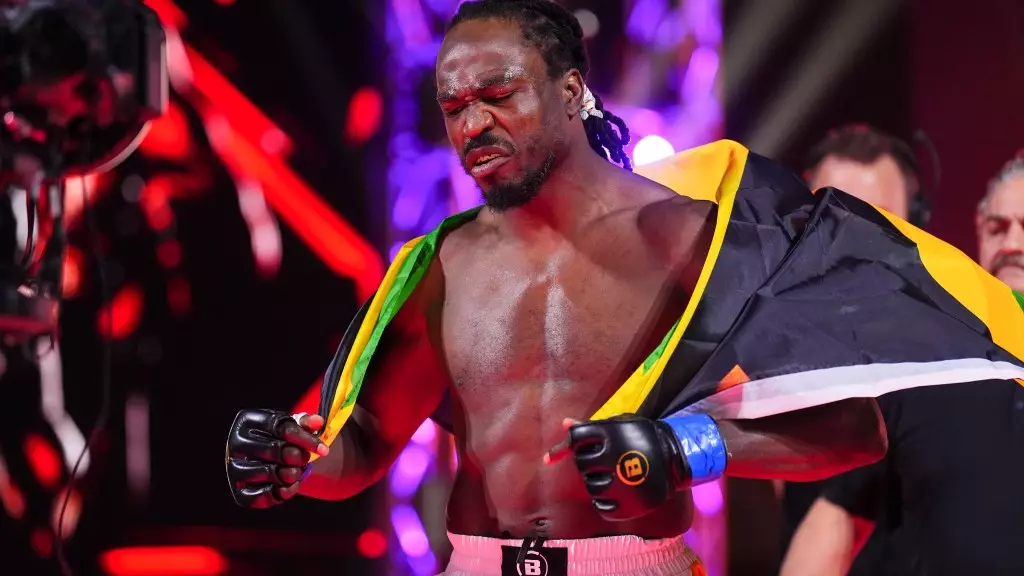Jason Jackson, the heralded welterweight with a professional mixed martial arts (MMA) record of 18 wins and 5 losses, steps back into the octagon with a renewed sense of purpose and determination. As he prepares for the upcoming 2025 Professional Fighters League (PFL) welterweight season, Jackson’s journey is laden with the kind of trials that can either forge champions or break spirits. His upcoming participation in a competitive eight-man tournament, alongside heavyweight contenders and former champions Andrey Koreshkov and Logan Storley, marks a pivotal moment in his career, ignited not just by past achievements but by the shadows of recent disappointments.
Jackson’s recent experiences reflect the often ruthless landscape of professional fighting, where a lack of organization and support can significantly impact an athlete’s performance. His tenure as a Bellator champion was crowned when he shocked the world by knocking out Yaroslav Amosov, but the transition from Bellator’s former management to the PFL brought unforeseen challenges that would haunt him.
The crux of Jackson’s determination lies in the ramifications of his last fight—a contentious decision loss to Ramazan Kuramagomedov. Jackson voiced his frustrations regarding not just the outcome, but the conditions leading up to the bout. Arriving in Ireland just a few days before the fight, he faced extreme jet lag and logistical hiccups, including visa issues that fell through the organization’s cracks. His emotional turmoil was palpable; fighting under such tricky conditions not only tested his physical skills but also attacked his mental fortitude.
“I felt like everything was unorganized, and it showed that night because I wasn’t myself at all,” Jackson remarked. This revelation raises a critical point about fighter preparedness and the need for equitable conditions in competitive sports. If fighters are thrust into uneven circumstances, the integrity of the sport can be jeopardized, resulting in tarnished reputations and uncertain futures.
Indeed, the emotional weight of competing in adverse conditions can lead fighters down precarious paths. Jackson’s admission that his anger led to mistakes—echoing past injuries from fighting aggressively under such duress—underscores a common, dangerous theme among athletes: the balance between passion and composure.
As Jackson gears up for the upcoming tournament, he acknowledges that anger must be transformed into something more potent: focus. He recognizes that to regain glory, he must ditch the emotional baggage and harness the joy of fighting. The venue of the PFL welterweight season in Orlando, Florida, is poised to provide a psychological boost due to its proximity to Jackson’s training center, Kill Cliff FC. The familiarity of training in the same state offers an opportunity for mental grounding—one that he gleefully anticipates to capitalize on this time around.
Fighter psychology plays a crucial role in performance, especially evident in Jackson’s reflections. Having experienced the detrimental effects of emotion on performance, he aims to enter the ring this time with a lighter heart. “I have to take this into consideration and just go have fun,” Jackson stated. By shedding the weight of resentment and concentrating instead on his techniques and instincts, Jackson not only strives for personal redemption but also sets a powerful example for fighters facing their own battles in and out of the ring.
As the countdown to the tournament continues, one question remains at the forefront: Who will Jackson face in his opening bout? Regardless of his opponent, the narrative remains compelling. With each fight, there exists an opportunity for Jackson to not just reclaim his title, but to prove that resilience is as crucial an attribute as skill. He faces not merely competitors but the ghosts of his recent past.
The combination of experienced fighters in the tournament promises thrilling bouts filled with drama and skill, but perhaps the most profound storyline will be Jackson’s personal struggle for redemption. While the arena may host the battles, it is the fighter’s internal conflicts—overcoming adversity and channeling that journey into personal growth—that ultimately crafts champions who inspire.
Jackson’s story serves as a reminder: success in MMA transcends mere statistics; it embodies the spirit of perseverance and the relentless quest for improvement. As April draws near and the action in Orlando unfolds, all eyes will be on him—both as a fighter and as a testament to the resilience that defines true champions.

